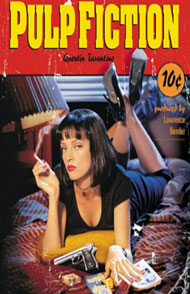
Pulp
Fiction
(1994)

Rated: R
Runtime: 2 Hours and 34 Minutes
Reviewer: Dale
Grade: A+I am about to make a statement that I would likely not have made in 1994, when you could not swing a dead cat without hearing someone rave about the brilliance of Quentin Tarantino.
Here it goes.
"Pulp Fiction" is underrated.
That's right. You heard me. By now, every film geek has moved on to their new god of cinema. Be it the Wachowski Brothers or Paul Thomas Anderson or M. Night Shalayman.
And, granted, each of those people is very talented. But let's not forget Quentin. By the time that "Jackie Brown" was released, only his third effort behind the camera, the country had overdosed on Tarantino and his film was released to general indifference. Even though that movie was a great film, and it had the same mastery of dialogue and skill of editing and plot structure as "Pulp", no one seemed to care. The public had gotten their fill of Mr. T, and I believe that is due, in no short part, to his imitators.
Tarantino started a revolution, and that revolution made us sick of him, even though it really wasn't his fault. He couldn't help it that he had made a masterpiece about criminals that, in turn, got every turd involving criminal behavior to be greenlighted by eager producers wishing to share some of Quentin's glory. He couldn't help it that movies like "Truth or Consequences: New Mexico" sucked. Or "Things to do in Denver When You're Dead". Or any number of shitty movies that tried to make their auteurs the next Tarantino.
But the reason that none of those imitations worked was simple. None of them possessed the assured craft that Quentin had. None of them had such heart and passion to back them up.
None of them captured the indelible humanity of their characters the way that Quentin so effortlessly could.
It isn't just his ear for dialogue, although that is a big component. The "Royale With Cheese" scene or the part in the Jackrabbit Slims restraunt just sound like the way that real people talk. No, there is more to it than that. It is the way he directs his actors to a level of excellence that few others have. Samuel L. Jackson believes in his character and in the choices of his character. That is why he works in the role, and inhabits it as if he were born to play it (which he was, if you ask me). Travolta understands that his character is trying so hard to be cool that he fails to understand the basics of human behavior, or the basics of any sort of logic, actually. This role made him a star for reasons that are all too apparent. Bruce Willis seems to know that his character is really not a lot more than just a charming sociopath.
The movie has its own reality. It's own logic. It establishes its own rules and never breaks them. It grounds itself in its own, remarkable reality and that makes us believe it also.
And Tarantino also throws in little touches that make the characters all the more human. They are not just pawns of the plot, as they are in any of the movies by Tarantino's pale imitators.
When Bruce Willis returns to his apartment and risks being caught by the gangsters he is attempting to elude, it is not for a stash of money or drugs. It is for a precious family heirloom that his girlfriend has forgotten. When Travolta freaks out after the overdose of his boss's girlfriend and takes her to the house of his drug dealer, they have a great debate over who will inject her with adrenaline that ranks with the best routines of Abbot and Costello or the Marx Brothers. When Jules experiences a miracle and wants to abandon his life of crime, we have come to know him so well that we accept his decision. We buy it. In a lesser movie, I doubt that we would have.
There are also all the little debatable touches. What's in the briefcase? Are all the clocks in the movie really stopped at 4:20? Does the band-aid on the back of Marsellus's neck really mean anything? The world may never know. And who wants to? Knowing would spoil the fun, and the debate. There are the plot twists that come out of left field, yet make sense. In reality, after all, anything can happen. There is the use of background music in lieu of a score.
All these things make "Pulp Fiction" a more interesting motion picture than most of
Tarantino's peers could ever fashion.
And, above all, it is also one of the greatest rides in the history of motion pictures. So sit back, grab a quarter pounder with cheese, and enjoy the fun.
Reviewer: Erik
Grade: A+
"Pulp Fiction" will go down in moviemaking history. Despite losing best picture in 1995 to "Forrest Gump", it's the most original movie to come along in ages. It's definitely not a movie for everyone. It's one hell of a ride.
Tarantino tells three stories in this movie, and they're out of order. The timeline isn't impossible to follow, but it's set up masterfully, keeping us interested. By the time the ending credits roll, you'll forget that a major character was killed an hour ago.
Involved in all three stories are a couple of hit men: Vincent Vega (Travolta) and Jules Winfield (Jackson). They trade long, funny stories about what they call quarter-pounders in France, and exactly what it means to give a woman a foot massage. But when it comes down to business, they get the job done.
The first story involves Vincent, and his date with his boss' (Marsellus Wallace) wife Mia "at his request" while he's away. Mia enjoys her drugs, and when she overdoses, Vincent has friends like Lance, who can save her with a needle to the heart.
The second story involves a boxer who Marsellus paid to throw a fight. But when the boxer (Willis) gets stung with pride, he wins the fight. Instead of fleeing immediately, he has to go back to his apartment for an object of sentimental value.
Lastly, Vincent and Jules are almost killed, and Jules is convinced it was divine intervention.
So, when a couple of low-life thugs try to knock over the diner where they're eating, how will Jules react?
There's a lot I'm leaving out. A *LOT*. The movie twists and turns in ways you won't ever see coming (the pawn shop scene, for example). There are other minor characters who leave a big-time lasting impression on you. The dialogue is so flashy, it can be watched repeatedly for that in itself. The movie also has smaller messages about redemption and faith, and whether or not you should save the life of someone who wants you dead.
"Pulp Fiction" is not liked by everyone, which is too bad. The movie is light years ahead of just about everything in terms of originality, plot and dialogue. And the acting (notably the performance of Samuel L. Jackson) is superb.
Maybe the movie will get the recognition it deserves when it becomes a classic years down the road. In fact, I'm sure it will.
